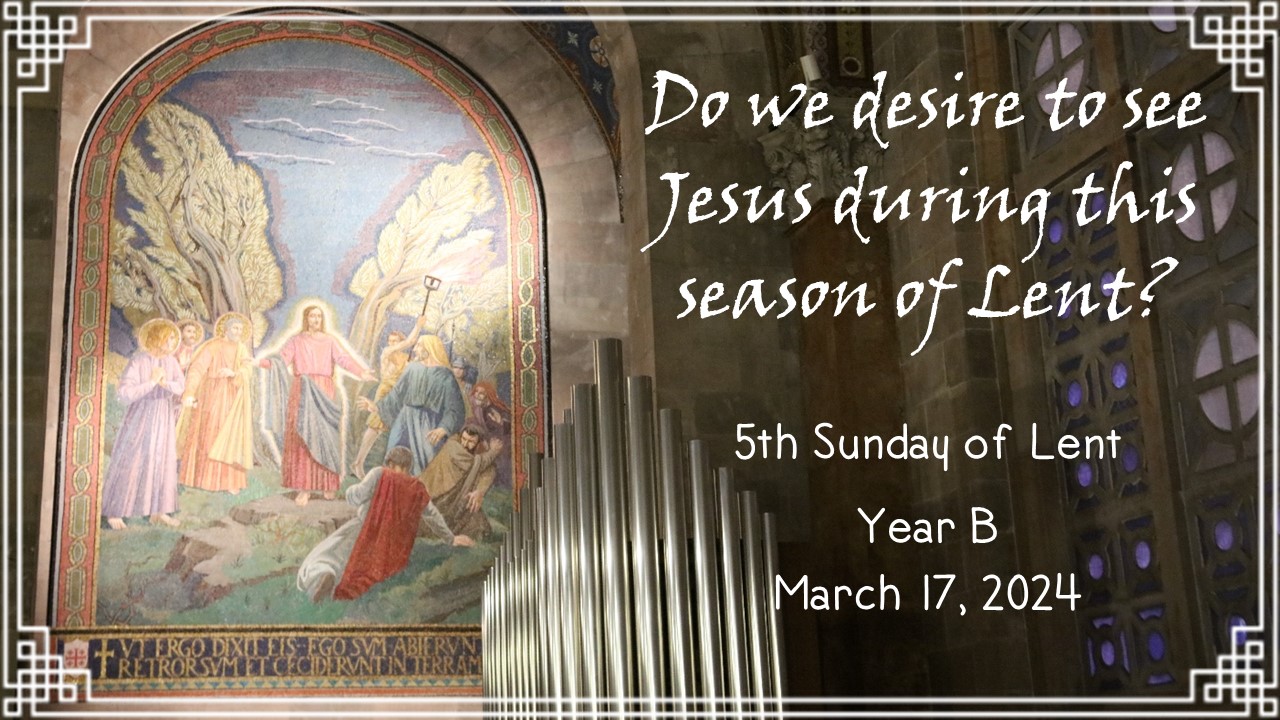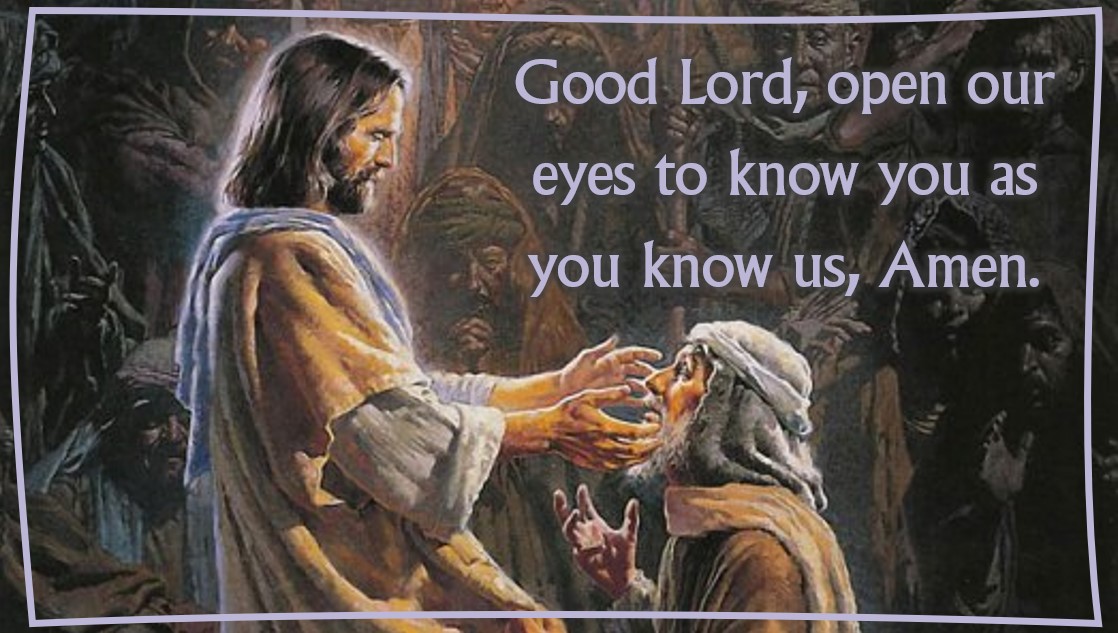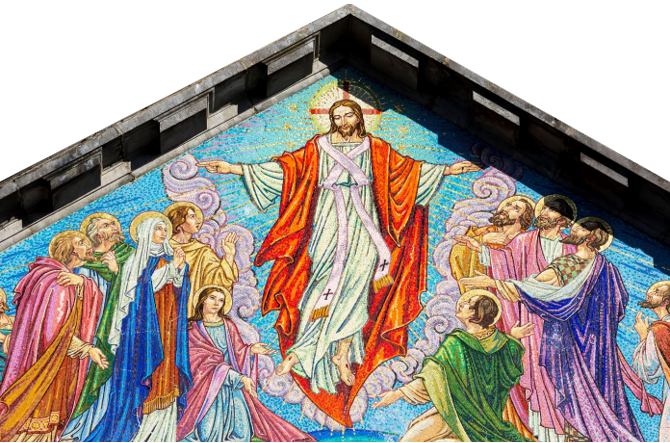
5th Sunday of Lent Year B ~ March 17, 2024
A DESIRE TO SEE JESUS
A little boy wanted to meet God. He knew it was a long trip to where God lived, so he packed his suitcase with Twinkies and a six-pack of root beer, and he started his journey.
When he had gone about three blocks, he met an old man. He was sitting in the park just staring at some pigeons. The boy sat down next to him and opened his suitcase. He was about to take a drink from his root beer when he noticed that the old man looked hungry, so he offered him a Twinkie. He gratefully accepted it and smiled at him. His smile was so pleasant that the boy wanted to see it again, so he offered him a root beer.
Again, he smiled at him. The boy was delighted! They sat there all afternoon eating and smiling, but they never said a word. As it grew dark, the boy realized how tired he was and he got up to leave, but before he had gone more than a few steps, he turned around, ran back to the old man, and gave him a hug. He gave him his biggest smile ever.
When the boy opened the door to his own house a short time later, his mother was surprised by the look of joy on his face. She asked him, “What did you do today that made you so happy? “He replied, “I had lunch with God.” But before his mother could respond, he added, “You know what? He’s got the most beautiful smile I’ve ever seen!”
Meanwhile, the old man, also radiant with joy, returned to his home. His son was stunned by the look of peace on his face, and he asked, “Dad, what did you do today that made you so happy?”
He replied, “I ate Twinkies in the park with God.” However, before his son responded, he added, “You know, he’s much younger than I expected.”
Our Lenten Journey is helping us to grow deeper into our relationship with the Lord. Everyday and every week when we attend the Holy Mass, we are introduced to various Sacred Scripture Readings to make us aware why our Lord died for us. However sometimes we fail to understand as in the First Reading people of Israel did. God throughout the Salvation chose a nation for himself and covenant with them starting from Abraham but very especially with Moses.
We might think of God as our friend, our teacher, and our master. And this is all true, but there is another facet of our relationship with God that doesn’t get quite as much attention, and that is God as our partner. In the very beginning of the Bible, this is the relationship we see. God creates man as a partner to help him spread more goodness throughout the world. Unfortunately, we, as human beings, didn’t live up to our end of the deal. It is this broken partnership with God that is the reason we are stuck with the fallen and corrupted world in which we live. The first step God takes in repairing this partnership is to select a small group of people and make a new partnership with them called a “covenant.” In this covenant, God makes promises to these people and asks them to fulfill certain commitments.
In total, there are four Old Testament covenants—one with Noah, one with Abraham, one with the Israelites, and one with King David. All these covenants serve the purpose of creating a new partnership into which God can eventually invite all humankind. Unfortunately, Israel eventually breaks these covenants with God.
Nevertheless, throughout the Old Testament, prophets talked about a day when God would once again create a new covenant, one that would completely restore all the broken covenants that came before it. Prophet Jeremiah talks about the same new covenant which God is going to make with his people however most of the times our understanding is like the man in the following story.
A man had a little daughter-an only and much-beloved child. He lived for her – she was his life. So, when she became ill and her illness resisted the efforts of the best obtainable physicians, he became like a man possessed, moving heaven and earth to bring about her restoration to health. His best efforts proved unavailing, and the child died. The father was totally irreconcilable. He became a bitter recluse, shutting himself away from his many friends and refusing every activity that might restore his poise and bring him back to his normal self. But one night he had a dream. He was in Heaven and was witnessing a grand pageant of all the little child angels. They were marching in an apparently endless line past the Great White Throne. Every white-robed angelic tot carried a candle. He noticed that one child’s candle was not lighted. Then he saw that the child with the dark candle was his own little girl. Rushing to her, while the pageant faltered, he seized her in his arms, caressed her tenderly, and then asked: “How is it, darling that your candle alone is unlighted? “Father, they often relight it, but your tears always put it out.” Just then he awoke from his dream. The lesson was crystal clear, and its effects were immediate. From that hour on he was not a recluse but mingled freely and cheerfully with his former friends and associates. No longer would his little darling’s candle be extinguished by his useless tears.
If we read Bible carefully, we could see there is more efforts by God to continue his relationship with us than we struggle. “The days are surely coming, says the Lord, when I will make a new covenant with the house of Israel and the house of Judah. It will not be like the covenant that I made with their fathers when I took them out of the land of Egypt – a covenant that they broke, though I was their husband, says the Lord”. Can we see the pain of God in these words?
Today’s Gospel reading is taken from the Gospel of John. We are reading much further into John’s Gospel than we have for the past two weeks. Chapter 12 of John’s Gospel is a preparation for the beginning of the passion narrative to follow. Jesus has just raised Lazarus from the dead – an important sign in John’s Gospel, which inspired many people to believe in Jesus. This event also marks the turning point in Jesus’ conflict with the Jewish authorities. John’s Gospel tells us that the Sanhedrin met after this event and made plans to kill Jesus. In the 12th chapter of John’s Gospel, Jesus is anointed at Bethany and enters Jerusalem in triumph. We again see evidence of the significance of the raising of Lazarus to this event; John reports that the crowds also gathered to see Lazarus.
Following his triumphant entry into Jerusalem, Jesus predicted his suffering, death, and Resurrection and prepared his disciples to believe in the salvation that his death would accomplish. Using the metaphor of the grain of wheat, Jesus presented the idea that his dying would be beneficial. He also taught that those who would be his disciples must follow his example of sacrifice. This theme will be repeated in John’s account of the Last Supper, when Jesus washed the feet of his disciples as an example of how they must serve one another.
The final section of today’s Gospel might be read as John’s parallel to the agony in the garden. Unlike the Synoptic Gospels, the Gospel of John does not record Jesus’ anguished prayer in the garden of Gethsemane before his arrest. Although comparable words are found in today’s reading, Jesus gives a confident response to the question he raises when asking God to save him from his impending death. After announcing his conviction that it is for this purpose that he came, a voice from heaven speaks, as if in answer to Jesus’ prayer. This voice, like the one heard at Jesus’ baptism and at Jesus’ Transfiguration—events reported in the Synoptic Gospels but not in John’s Gospel—affirms that God welcomes the sacrifice that Jesus will make on behalf of others. In John’s Gospel, Jesus teaches that this voice was sent for the sake of those who would believe in him.
Through His death and resurrection Jesus established a new covenant in his blood as we heard in the first reading. From an old covenant of Judgement to a new covenant of Forgiveness of Sin.
The Gospel teaches us that new life and eternal life are possible only by the death of the self through suffering and service. Our covenant with God can never be complete if we are not ready to toe His path of suffering and dying for others. By his cross, He showed us an example we should follow. A TRUE CHRISTIAN DOES NOT SEEK HIS OR HER OWN COMFORT AT THE EXPENSE OF OTHERS. Salt gives its taste by dissolving in water. A candle gives light by burning its wick and melting its wax. We gain eternal life only through self suffering and death for others. “We make a living through what we get but we make a life by what we give”.
It may sound absurd and unimaginable to some, each time God reminds us of loosing our lives if we love it, but this is the absolute truth about our Christian life and calling. This is what defines the Christian life and experience, without which the Christian life is vague and empty. If there is anything that distinguishes a worldly person and a Christian, it is the ability to offer oneself, taking the risk with one’s life at stake to save another, to deny and deprive oneself of one’s comfort and pleasure to make the life of others better.
Holy Father Pope Francis reflects on the Gospel this way “some “Greeks”, of the Jewish religion, who have come to Jerusalem for the feast of Passover, turn to Philip and say to him: “We wish to see Jesus”. There are many people in the holy city, where Jesus has come for the last time, there are many people. There are the little ones and the simple ones, who have warmly welcomed the Prophet of Nazareth, recognizing Him as the Messenger of the Lord. There are the High Priests and the leaders of the people, who want to eliminate Him because they consider him a heretic and dangerous. There are also people, like those “Greeks”, who are curious to see Him and to know more about his person and about the works He has performed, the last of which — the resurrection of Lazarus — has caused quite a stir.
“We wish to see Jesus”: these words, like so many others in the Gospels, go beyond this episode and express something universal; they reveal a desire that passes through the ages and cultures, a desire present in the heart of so many people who have heard of Christ, but have not yet encountered him. “I wish to see Jesus”, thus He feels the heart of these people”.
Furthermore, continuing in his prophecy of the imminent Passover, Jesus uses a simple and suggestive image, that of the “‘grain of wheat’ that, once fallen into the earth, dies to bear fruit. In this image we find another aspect of the Cross of Christ: that of fruitfulness. The death of Jesus, in fact, is an inexhaustible source of new life, because it carries within itself the regenerative strength of God’s love. Immersed in this love through Baptism, Christians can become “grains of wheat” and bear much fruit if they, like Jesus, “lose their life” out of love for God and brothers and sisters.
Some quotes from the saints to help us to have a desire to see the Lord.
“Those whose hearts are enlarged by confidence in God run swiftly on the path of perfection. They not only run, but they also fly; because, having placed all their hope in the Lord, they are no longer weak as they once were. They become strong with the strength of God, which is given to all who put their trust in Him.” Saint Alphonsus Liguori
“Father, I am seeking, I am hesitant and uncertain, but will you, O God, watch over each step of mine and guide me.” Saint Augustine
“Hold your eyes on God and leave the doing to Him. That is all the doing you have to worry about.” Saint Jeanne de Chantal
“Do not fear what may happen tomorrow. The same loving Father who cares for you today will care for you tomorrow and every day. Either He will shield you from suffering, or He will give you unfailing strength to bear it. Be at peace, then, and put aside all anxious thoughts and imaginings.” Saint Francis de Sales
A story by an unknown author to reminds us to recognize Jesus…
Ruth looked at the envelope again. There was no stamp, no postmark, only her name and address. She read the letter one more time…
Dear Ruth,
I’m going to be in your neighborhood Saturday afternoon, I’d like to stop by for a visit.
Love Always,
Jesus
Her hands were shaking as she placed the letter on the table. “Why would the Lord want to visit me? I’m nobody special. I don’t have anything to offer.”
With that thought, Ruth remembered her empty kitchen cabinets. “Oh, my goodness, I really don’t have anything to offer. I’ll have to run down to the store and buy something for dinner.”
She reached for her purse and counted out its contents. Seven dollars and forty cents. “Well, I can get some bread and cold cuts, at least.” She threw on her coat and hurried out the door.
A loaf of french bread, a half-pound of sliced turkey, and a carton of milk…leaving Ruth with a grand total of twelve cents to last her until Monday. Nonetheless, she felt satisfied as she headed home, her meager offerings tucked under her arm.
“Hey lady, can you help us, lady?” Ruth had been so absorbed in her dinner plans; she hadn’t even noticed two figures huddled in the alleyway. A man and a woman, both dressed in little more than rags.
“Look lady, I ain’t got a job, ya know, and my wife and I have been living out here on the street, and, well, now it’s getting cold and we’re getting kinda hungry and, well, if you could help us, lady, we’d really appreciate it.”
Ruth looked at them both. They were dirty, they smelled bad and, frankly, she was certain that they could get some kind of work if they really wanted to. “Sir, I’d like to help you, but I’m a poor woman myself. All I have is a few cold cuts and some bread, and I’m having an important guest for dinner tonight and I was planning on serving that to Him.”
“Yeah, well, OK lady, I understand. Thanks anyway.” The man put his arm around the woman’s shoulders, turned and headed back into the alley.
As she watched them leave, Ruth felt a familiar twinge in her heart. “Sir, wait!” The couple stopped and turned as she ran down the alley after them. “Look, why don’t you take this food. I’ll figure out something else to serve my guest.” She handed the man her grocery bag.
“Thank you, lady. Thank you very much!” “Yes, thank you!” It was the man’s wife, and Ruth could see now that she was shivering.
“You know, I’ve got another coat at home. Here, why don’t you take this one.” Ruth unbuttoned her jacket and slipped it over the woman’s shoulders. Then smiling, she turned and walked back to the street . . .without her coat and with nothing to serve her guest. “Thank you, lady! Thank you very much!”
Ruth was chilled by the time she reached her front door and worried too. The Lord was coming to visit and she didn’t have anything to offer Him. She fumbled through her purse for the door key. But as she did, she noticed another envelope in her mailbox. “That’s odd. The mailman doesn’t usually come twice in one day.” She took the envelope out of the box and opened it.
Dear Ruth,
It was so good to see you again. Thank you for the lovely meal. And thank you too, for the beautiful coat.
Love Always, Jesus
The air was still cold, but even without her coat, Ruth no longer noticed.
Do we desire to see Jesus during this season of Lent?
Other Sermons In This Series

24th Sunday in Ordinary Time Year C ~ September 11, 2022
September 08, 2022

4th Sunday of Lent Year A ~ March 19, 2023
March 17, 2023


